Betty and Lou’s Joint Biography
1944 to present
This section covers the joint lives of Betty and Lou Cassorla,
from their wedding onward.
This page last updated: 8-14-04
Recent additions:
8/14/04:
Professor Block, 2003, 1962 - Marshall & Lou shaving:
Pahanakootie Fish story, 1959;
Our Wedding: Wednesday, March 14, 1944
It was traditional for the bride’s father to take over the
expense of the wedding. However, that was not to be. It was a buffet type
meal, with hors d'oeurvres. It was done by a duo called The Twin Cantors,
which was a business with a catering hall and two actual cantors who performed
the ceremony. We had no pictures of them.
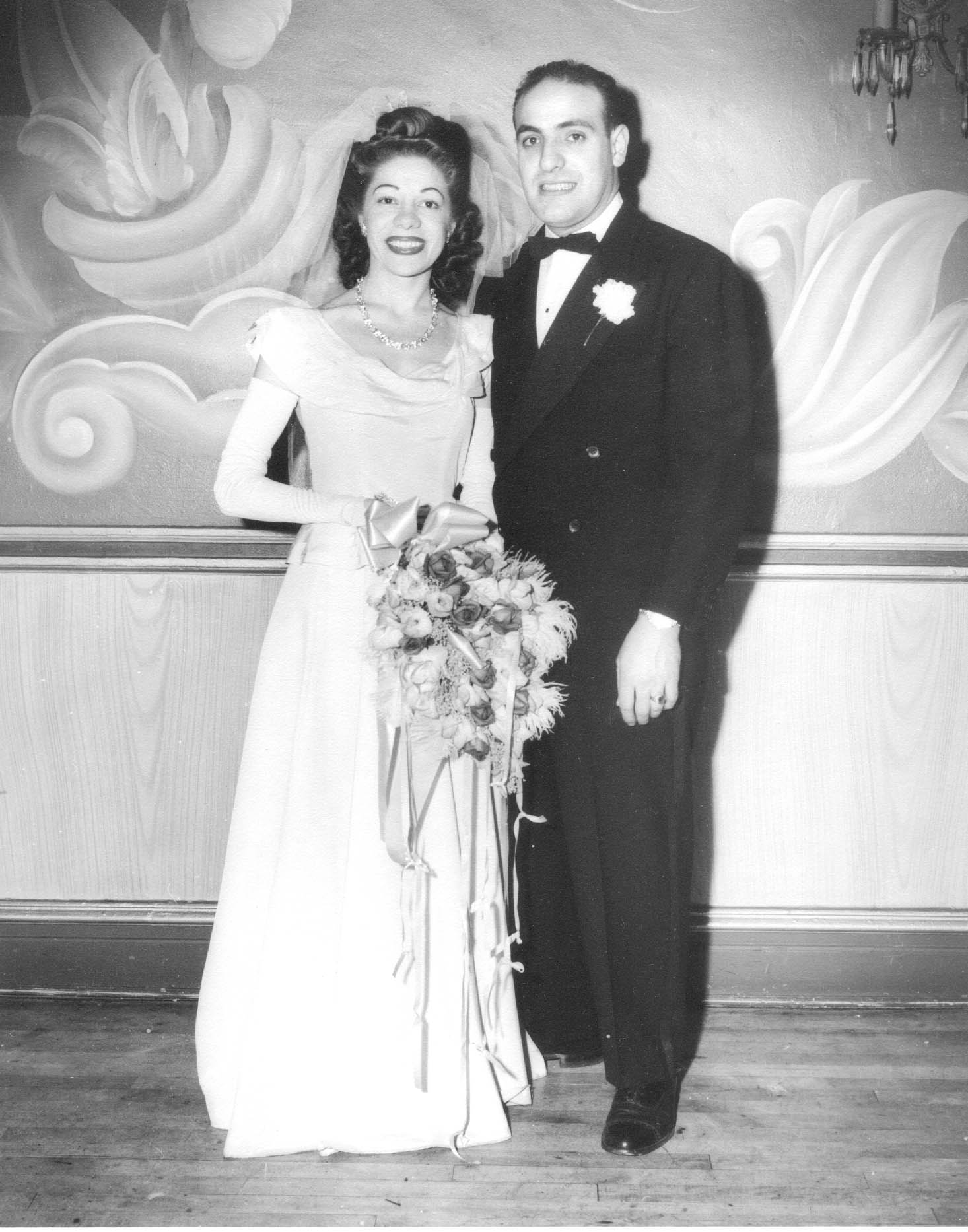 |
| Betty and Lou's wedding portrait, March 14, 1944 |
We had fifty or sixty people. There were no invitations, and all inviting
was done by telephone.
My cousin Izzy said that instead of a present, he’d take pictures.
They ended up with white spots, but the few that turned out well, I covet
and treasure.
While the cantor was praying, he was singing so sharply, that I (Mom)
was shaking like crazy! |
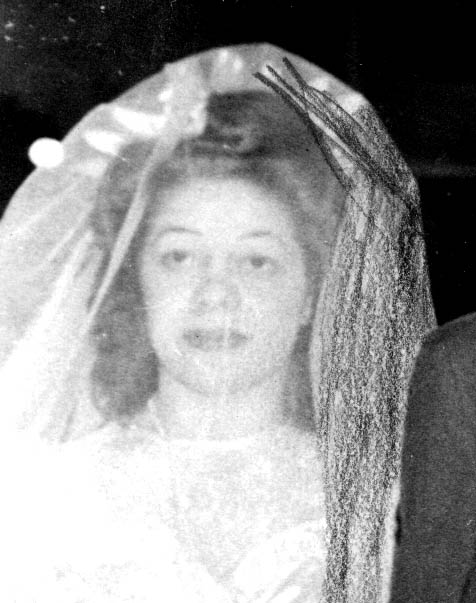 |
I (Dad) was watching his nostrils go up and down. Uncle Gabriel, Aunt
Victoria, Uncle Josef and Dora came in from Rochester, New Lots.
| There were maybe twelve days from when we decided to get married to when
we did. |
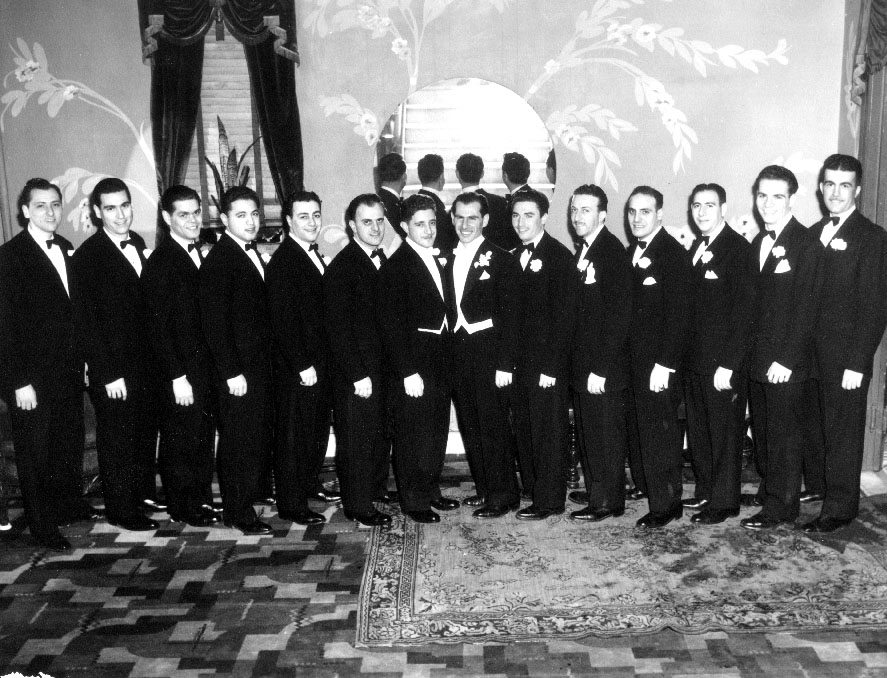 |
| |
The men at our wedding, all in a row. |
 |
| Left to right are: Chubby (Abe) Mevorah, Moishe Copio, Eli Rousso, Hymie
Baruch, Benny (Flash) Elias, Callie (Jack) Zacheria, and Jack Camhi |
 |
| Left to right are: Teddy Cohen, Lou Calderon, Itzy Horowitz, Lou Cassorla,
Irving Copio, Leo Cohen and Jack Hazan |
 |
| Betty at age 22 in her official wedding portrait. |
We were all getting hungry and everyone else was eating sandwiches. Grandpa
Cassorla showed Dad some frankfurters and he, Louie and I ended up eating
them.
We sat by a wall, and there were tables.
The whole wedding cost four hundred dollars, says Dad. "I know because
I paid it." We paid the expenses out of our gifts, which just about
handled it.
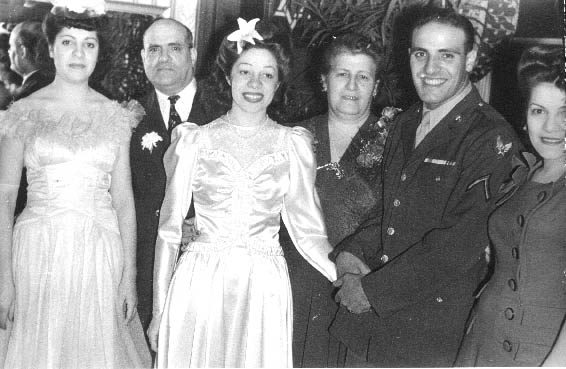 |
| At the wedding in 1944…left to right: Bessy Hasson, Avrahm Cassorla,
Betty, Sophie Cassorla, Lou and Molly Baruch |
We had wine and soda and that was it. We went to a professional photographer,
Paradise Studios, for the photo. The gown was lovely, but to this day I
can't believe it only cost five dollars! We were very much in love and very
happy. I remember schlepping to a hotel and going to the IRT.
Of course I didn't wear the gown into the subway. I had a nice little
figure then (Mom says with a sigh).
Selma said to me "You now Betty, you gotta get yourself a trousseau."
In those days we had customary flowers. She asked to borrow my flowers
and she put them into her hair.
I went shopping and I got two or three little suits. |
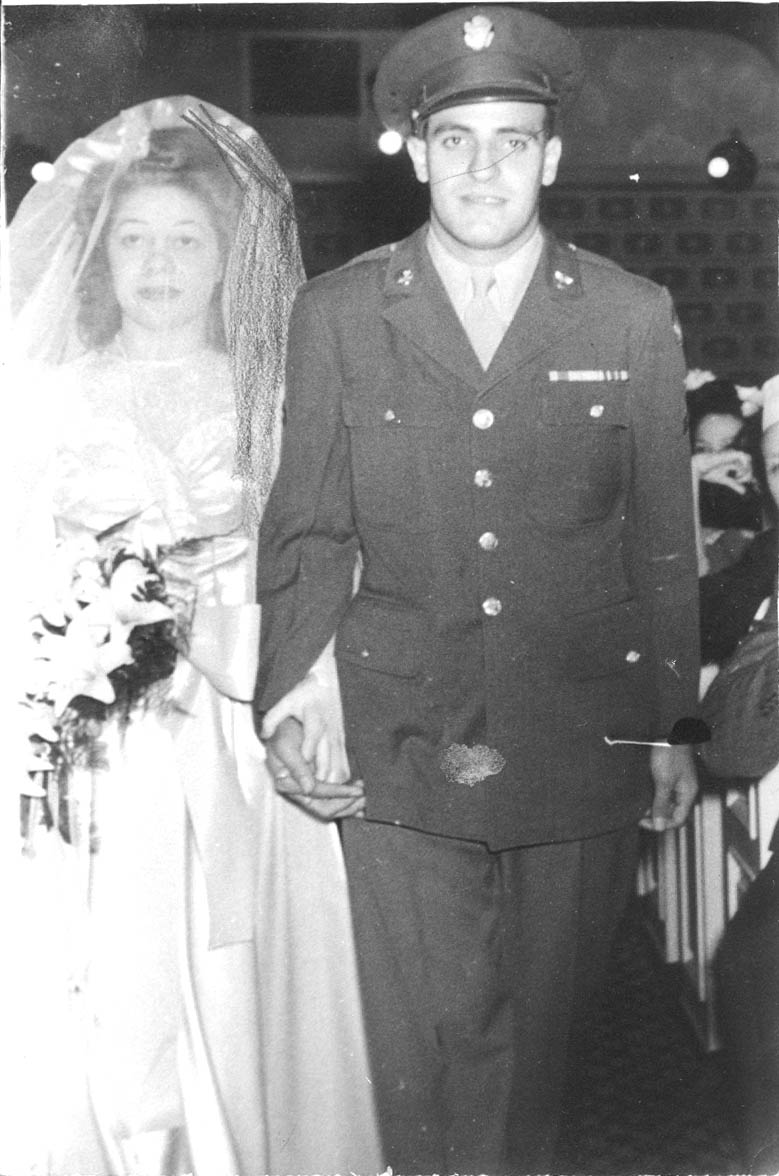 |
| |
Here we are, walking down the aisle. |
Selma was good for me in knowing how to shop economically, even though
she was younger than me. So we went to May’s Basement. |
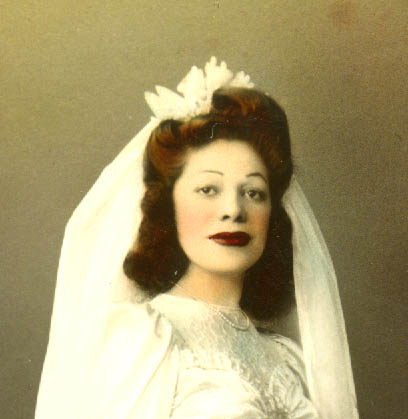 |
| |
|
| Our Honeymoon at the Stanley Hotel in Lakewood,
New Jersey, March, 1944
Uncle Joe told us where to go for our honeymoon. We took the IRT
with our luggage and a little money. We could have taken a cab, but we needed
the money that we had, or maybe we were just stupid not to take the cab!
I had my sweepstakes winnings in the bank.
The honeymoon wasn't much. We went on a horse and buggy ride through
the countryside. We have some nice pictures of that. We met some nice people
and made friends with them. We stayed for four days.
Mom: "That was the first time I experienced a place like that."
Joe had said, "This is the place to go." |
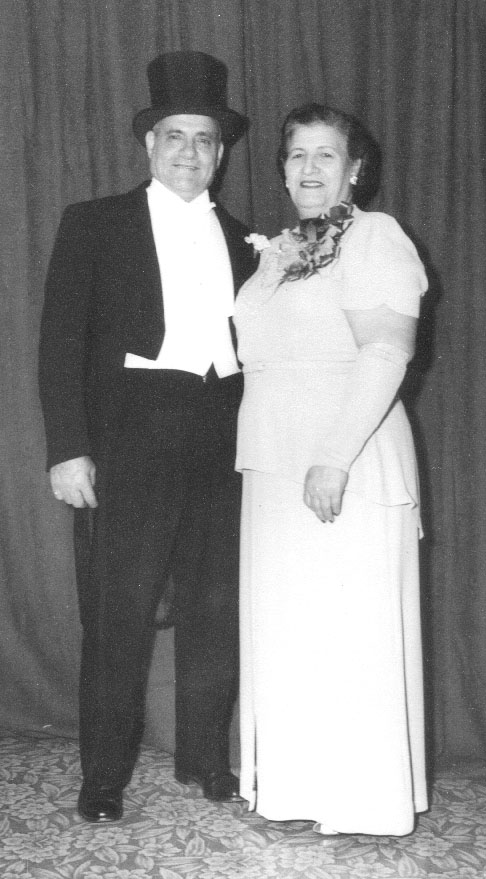 |
| We had a good time for four days. |
Lou's parents, Avrahm and Sophie Cassorla, 1944, at our wedding. |
It was mid-winter, March. No snow on the ground but cold, but we were
so much in love it didn't matter.
They had peacocks hanging around on the hotel grounds.
Mom stayed with her mother at that point.
Mom: "I went to work and kept giving my father closed pay envelopes."
I continued to live there for a month at the 661 Williams Avenue address.
That was the month of April.
Dad: "I knew I was going there, to Charleston Air Force base." |
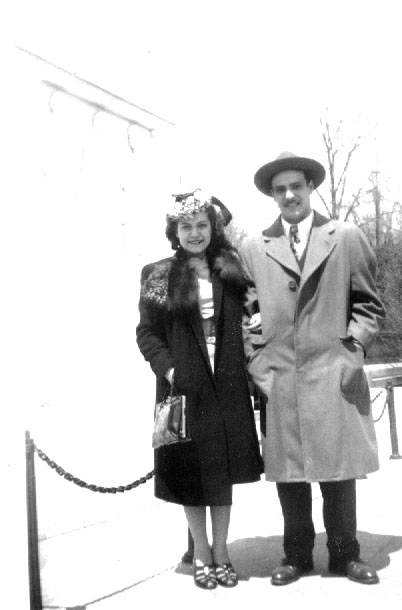 |
| |
In 1944 with Molly, taking a trip to Washington, D.C. |
I rented a room from a witch, an anti-semitic southern woman. I paid
24 dollars a week, and we shared the bathroom with 20 people. I went there
and secured a room with a fireplace. We kept in contact through the phone.
We had the apartment waiting for us when we finally moved in together.
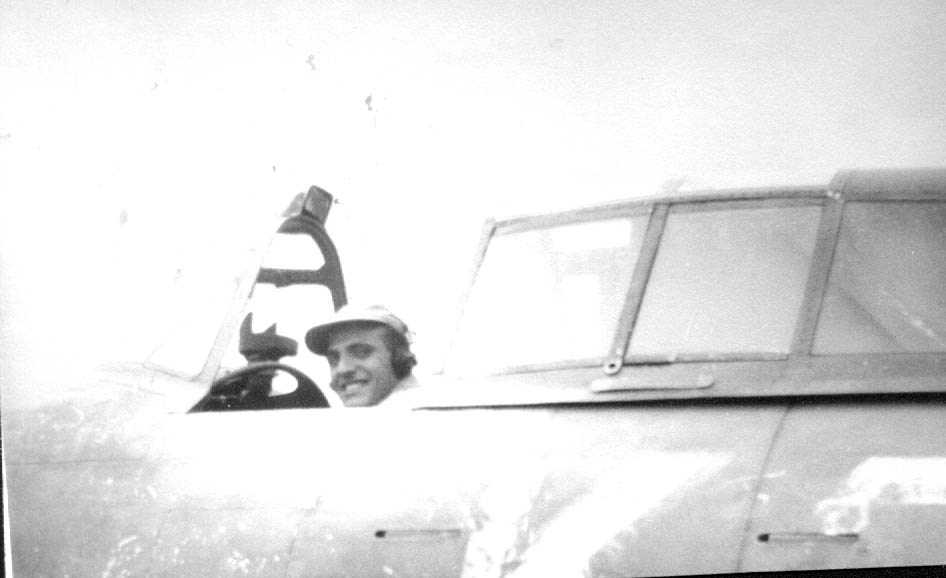 |
|
In the cockpit of a P-40 patrol or fighter plane, in Charleston, South
Carolina. Many different types of planes rolled through the base. I took
the opportunity to test the feel of this one.
|
Mom: "I asked my Mom and Dad to send us a radio. So they sent us
one by mail."
The radio they sent us was called a camera radio, not much bigger than
a camera. It had a small, compact powerful battery. So I would hook up the
two batteries available to us as military personnel, just to make the connection.
We put in on the broken old mantelpiece. The ceiling was so high - ten feet
high.
Mom: "I’d go into the bathroom, and there would be two men
there because we had to share the bathroom. I’d say Oh my God!"
Dad: "Sure it was great living together."
Mom: "I wanted to make a call to my parents, but you wouldn't let
me, and I cried. You said it was too expensive. I grew up right then and
there."
Then Dad and I went to buy a nice white dress from Lerner’s. We
were very proud of the dress, perky and white. All of a sudden, there was
a heavy woman wearing the same exact dress!
We then visited a woman who looked like Dad's mom, named Mrs. Laufer.
She was the owner of her restaurant called Laufer's. We loved her breaded
veal cutlets and corn fritters. She took me into her kitchen to see where
and how she cooked. It was spotless. We liked her very much. She was ashkenazi,
but she made corn fritters and breaded veal cutlets. It was our favorite
food.
Albert: "Did you visit the famous gardens at Charleston?"
Mom and Dad: "Never went."
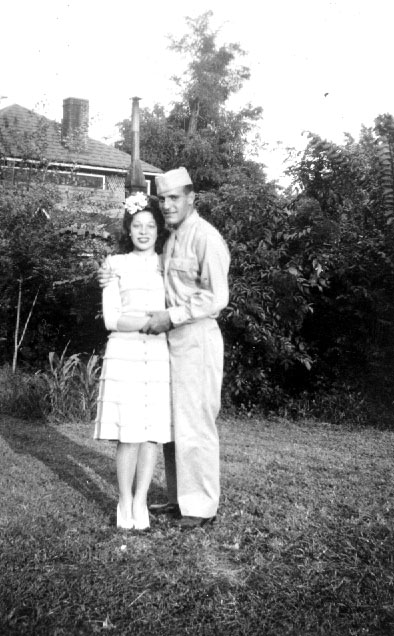 |
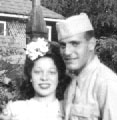 |
|
In Charleston, in 1944.
|
June, 1944 - Charleston, continued
I took a test to be eligible for housing, which is considered two rooms.
This was done under dad’s name. Under a GI registration, it’s
fourteen dollars a month. As a civilian it was 37 dollars a month. They
denied me an apartment, lying, because they wanted civilians who would pay
full rates.
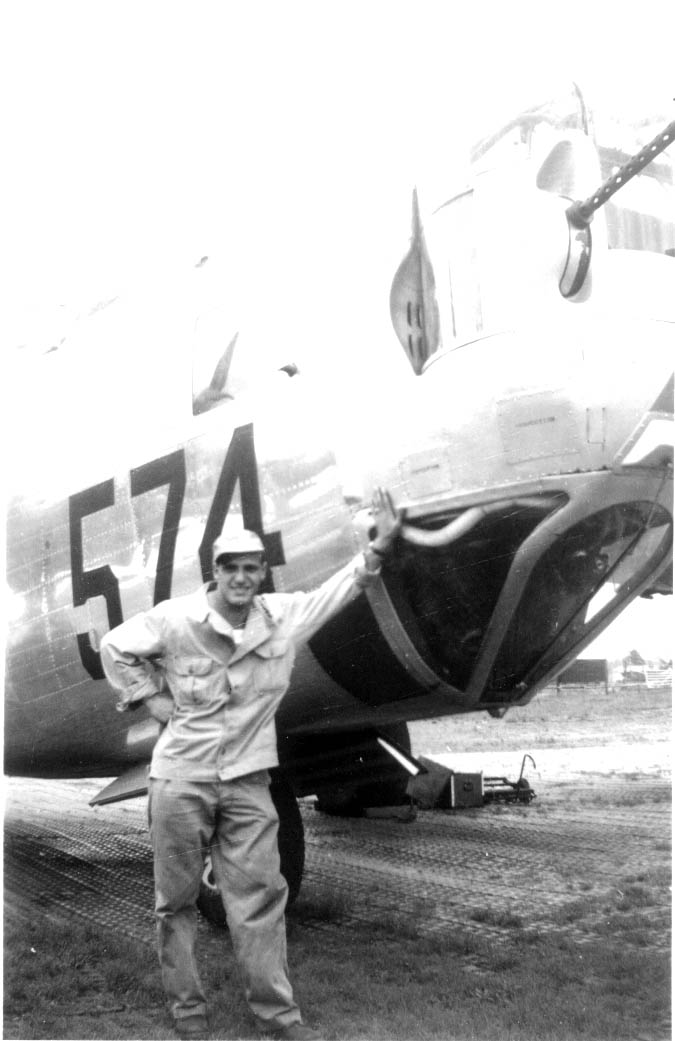 |
A man named Charlie took care of the big giant freight trucks that came
in, carrying the engines. He was a heavy guy. They had all the gasoline
stamps, all they’d want.
Mom: "Our apartment was in cinderblock buildings that was flat.
Ours was called 1-6-3D Kiska Place. It had a wood burning stove and a propane
stove. We’d put a pot of water in it.
"To rent that apartment, I had to take a test.
"But this southern woman said, ‘I don't want to give a Yankee
a test. You don't know our shorthand. We use the Gregg system. Up north
you do Pittman shorthand." |
| Lou with a B-24 Bomber in Charleston, July, 1944. |
|
I had to go to headquarters and find this woman who would give me the
test. She was big and tall and if she blew on me, I'm certain I would fall
over.
I came upon two officers and asked how I could get to headquarters.
The first one said, "What is this? An open street? Coming in and
asking questions?"
The other man said, "Let me help you, ma'm." At headquarters,
they asked me many questions about Lou and his rank and his stationing.
He said, "All right, you can take the test right here at headquarters."
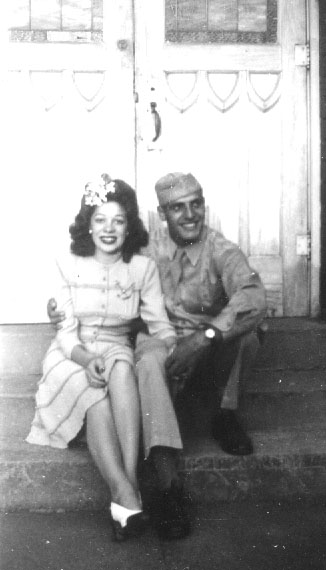 |
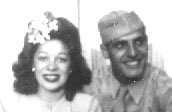 |
Romantic in Charleston, 1944.
|
I took the test and brought the papers to the man. I passed! That’s
how we got the apartment! It had maple furniture. We bought the furniture
for 120 dollars. It consisted of a bed and more. We sold it for the same
amount when we moved out.
Dad was working near an air force supply. They asked me if I wanted to
work near my husband. I said yes. Through that, I began to sew yellow fabric
which they used in the flight line for flags.
I used the sewing machine in the post to make curtains for the sink in
our apartment. There were wooden framed sinks with dingey galvanized metal.
I also made cute bedspreads and curtains. In a way it was stealing, but
nobody minded. They had thousands of yards there, all we needed were seven
yards!
I worked myself up to work for Captain Matalski. He looked like Johnny
Carson, tall and thin. He never knew I was Jewish. We had a very good time.
He had a small office and we had staff sergeants and WACs there. Captain
Matalski found out one day that Louie was Hebrew, and I was Jewish. From
that day on, he didn't want to have anything to do with me. Prior to that,
he took me out to lunch and such.
At this time, we watched baseball games and a World Series was on. I
put a dollar in a pool and I won so much. So I told the staff sergeant,
"Let’s make a party for everyone." We bought kegs of beers
and more. I spent a few hundred dollars. I did it to show everyone that
Jewish people are very nice.
People were very appreciative. It built good will. I didn't care if he
spoke to me or not -- it was the end of the war. Earlier they asked if soldiers
wanted to be transferred to Atlanta. Captain Matalski asked me if I wanted
to be transferred. The captain also removed Lou’s name from that list,
so that was a nice favor he did for me. He never said anything anti-semitic,
just got very cold.
I wanted some footlockers that they had, and they gave me two of them
as a gift to take home. I still have them in the basement! They were packing
cases, but they did the job. In the same way, I was very close to the police,
the lawyers, the judges, and I had a very good time.
Leo B. Roche was there, and he said "Hiya, Betty! I want to enter
you in the Beauty Contest!" They didn't have silk stockings then, so
we had no stockings. We drew a line on the backs of our legs to simulate
a stocking seam! We also wore leg makeup. It was so nice!
Miss Charleston Beauty Contest, July 1944
Dad submitted my picture
to the base paper. The commanding officer had a chubby daughter also entered.
The contest was held on the street. All of us girls were in a tent. Everyone
knew the colonel’s daughter would win even though she came from another
camp. Sure enough, she won!
I cut myself on a nail on a tent pole. A GI gave me a handkerchief to
control the bleeding. I was shivering and shaking.
A GI said, "Oh! You’re going to win! You’re for me, you're
going to win!"
The crowd applauded and whistled. Maybe there were 300 or 400 men there.
I was dying! Imagine your mother! They had glossy pictures of me and
other girls in the PX. |
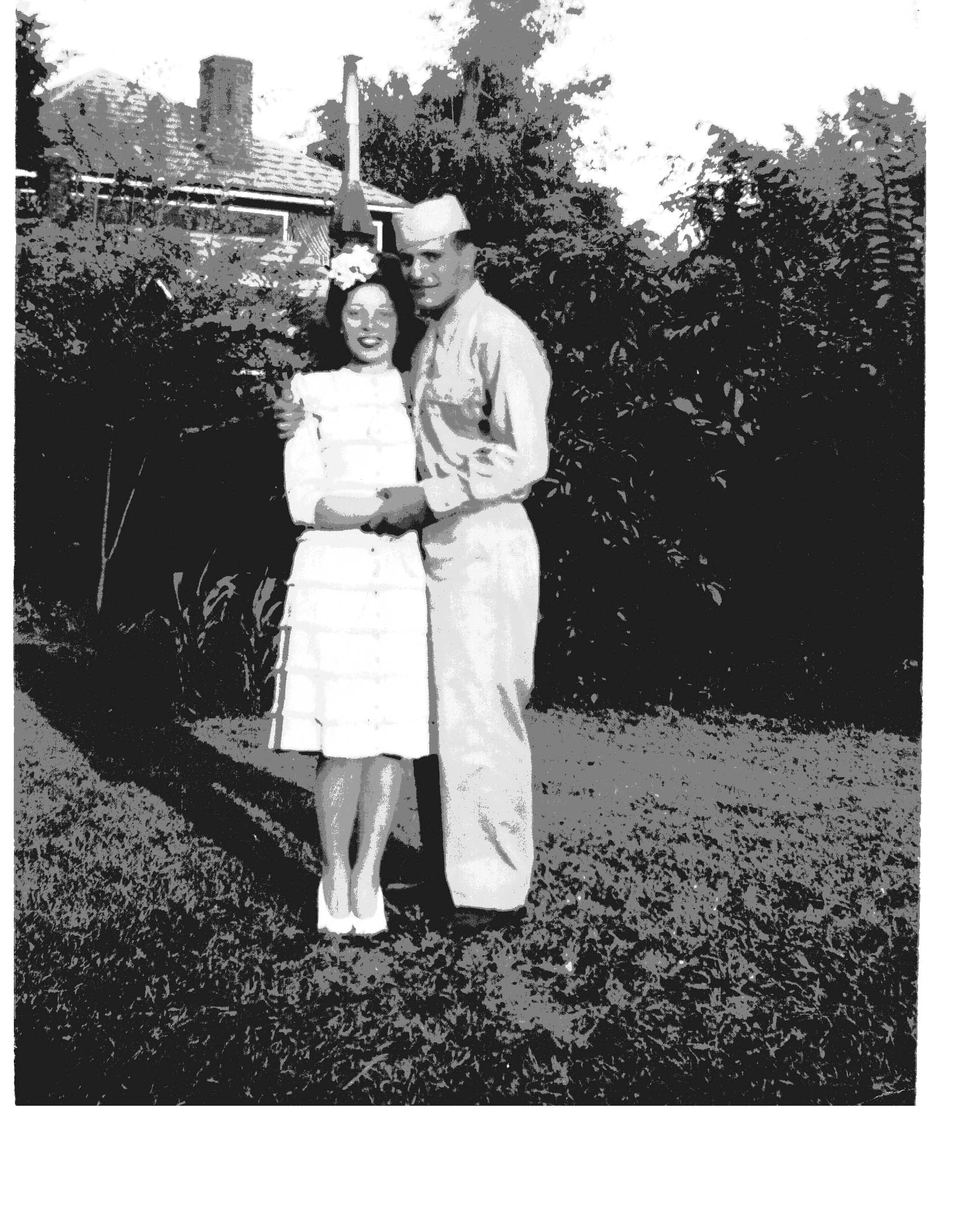 |
People wrote things near the pictures like:
They were very nice men - boys really.
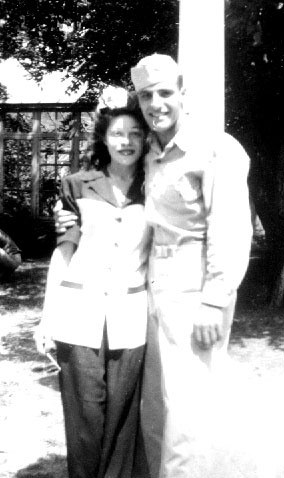 |
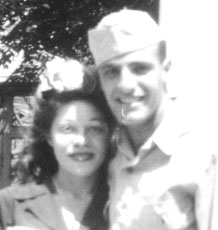 |
| In Charleston, 1944 |
There was also a four-foot high cut-out of me in a bathing suit. So we
thought sure enough I’d win. Everyone in the PX would see the cut-out
in the corner. It just had a picture of me and it said, "The Winner."
But this was not true. The actual winner was another Betty. The voting was
done by whistling.
Then the warrant officer, Leo B. Roche, a Southerner, heard that someone
named Betty won. He thought it was me. He came in with flowers and said,
"Here Betty, for winning!" I told him it was someone else, and
he was fit to be tied! He adored me, like an Uncle.
Jack Hazen the friend was the tallest man and he made money during the
war. We don’t know how he got put out of the service, Nor did we know
how Hymie got out. He became an officer and a navigator. at the height of
the war, he found himself home. He said, found myself airsick.
Sammy Albuker became a range officer.
Skipping forward to 1969:
Our Return trip to Florida and Charleston
Twenty-five years later,
in 1969, we took the same picture in Charleston that we had taken in 1944.
We drove to Florida that year and stopped at Charleston for a couple of
days. We wanted to go to the old haunts and see our apartments.
The military and defense workers’ apartments were all torn down
by then.
1944: The bottle-throwing incident in North
Charleston
This is the same town
where Gershwin’s Porgy and Bess took place. Callie was stationed
at Ft. Bragg, NC. He came to visit us, and we saw him off at a bus stop
in North Charleston. We took another bus closer to where we lived, maybe
nine - ten miles from Charleston itself.
We were passing through an area that was off-limits to any soldiers,
a rough neighborhood on the outskirts of North Charleston. It was a very
decrepit neighborhood. Somebody threw a whiskey bottle through a closed
window of the bus.
It hit the glass and shattered all over us. I was the worst injured.
I was bleeding quite profusely.
All of a sudden, the place was surrounded by MP’s.
I don't know how they got an alarm out so quickly. They gave me a butterfly
bandage and I still bear a scar.
We wanted to bring a lawsuit against the bus company.
A lawyer visited us and offered us 25 dollars to make a settlement.
I consulted a lawyer and said that wasn't enough money.
We refused that settlement, and we got nothing for it! |
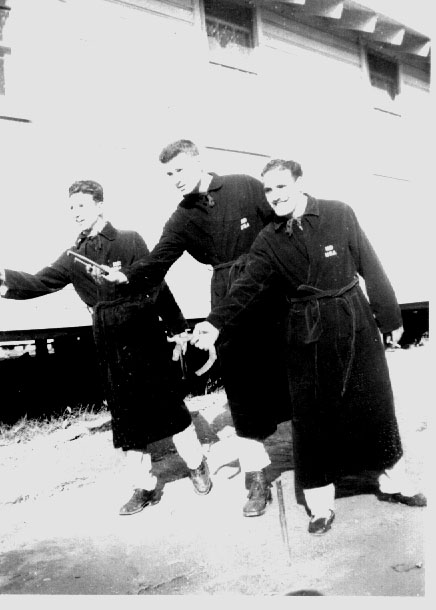 |
|
Pitching woo with Betty wasn't all I pitched . Here I am at horsehoes!
|
1945: Racial attitudes in Charleston
At the Commissary in
Charleston, I was struck by the humility of the kitchen worker, an African-American.
He was one of the few non-white employees there. He acted thoroughly unproud
of himself. He showed it in his "sirring" us all over the place,
and his stepping aside.
There was no way a man should love with such humbleness. I never knew
his name.
I tried to humanize him, by treating him well.
Black troops were separately quartered back then.
At one point I was called in by a captain in a solo conference, to find
out if I minded working in close quarters with a black man who had the same
radio training I did.
I went overboard in saying that I had no problem with that.
Even if I did mind, he said they would have to send me away rather than
make adjustments. |
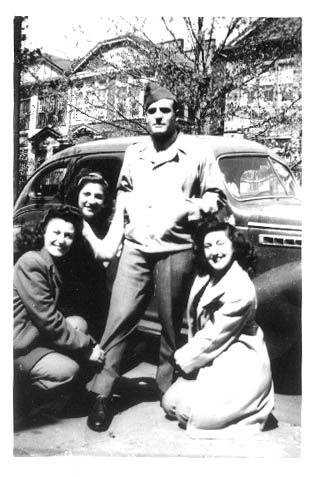 |
| Lou in 1945 with the ladies: left to right: Betty Aldorati, Betty Hasson,
Lou, and Bella Camhi. Lou was on furlough. |
Discharge from the Army, November 1945
Dad had about 56 points
from his time in the service and overseas duty, so we were the second of
third group to be discharged. We were in Charleston for a year and a half,
because were comfortable there.
We sold the apartment furniture, pots and pans, pillows, kitchen table
-- it as a darling, darling little house. I made it so neat. We always had
flowers. Now we went to Brooklyn. We had a ‘31 Chrysler at the time,
and it had 2 little windows, I made little curtains for the back window.
We made it very nice and cozy.
Going to Charleston
Mom: "I had nothing because I always gave my father my closed
pay envelopes. Once I said, ‘Pa,’ I have to go with my husband.’
‘Louie esta yamando’ (calling)"
Dad: "He saw his meal ticket running away."
Mom: "He said, ‘I need money." He and my sister Esther
had been the bread winners. There was no medicare or medicaid, so he depended
on me. He objected to my leaving, ‘No no no, no puedes ir ('No,
you can't leave'). How am I to maintain my house?"
My mother said, "Esta casado ahora." ("She is married
now")
Charleston Air Force Base, and
Getting Married in March, 1944
The Famous "Circling Planes" Incident,
Fisher’s Island
I was in our radio shack,
and call came over that the transmitter that told the landing was difficult.
I came ambling into the shack very unconcerned. The captain, unaware of
how slight my training was, said, "Cassorla! Go to operations, get
yourself a parachute and there’ll be a bomber waiting for you."
I went there, not knowing what to do. I went to operations, left my jeep
at the side, and I struggled to put on a parachute. I had a well-insulated
screwdriver and a small toolbox. I got into an A-25 twin engined plane,
the same kind that bombed Tokyo with Doolittle. It brought me to Fisher’s
Island where I met up with two radio operators.
Planes were circling and running out of gas.
"Are you from Charleston Air Force Base?!" I opened up the
portal of the control tower apparatus. I saw 2-foot high radio tubes - much
bigger than I’d seen anywhere. People were looking over my shoulders
eagerly. I poked around with the screwdriver, and sparks started to fly.
Someone said, "Yeah! Yeah! You're making contact." It had started
to work!
Mom: "He came home that night and bellowed, ‘Babe, you don't
know what happened to me today!"
Those boys in the airplane went on ahead to fight in Europe.
Forklifting with Mom
Soldiers lifted me up on a forklift to write down
numerals that were on the planes. Another time, we went to see beautiful
glass ball turrets and smash them and stamp them as obsolete. They were
brand new. The war was over at that time.
Dad: "We also destroyed many radio tubes."
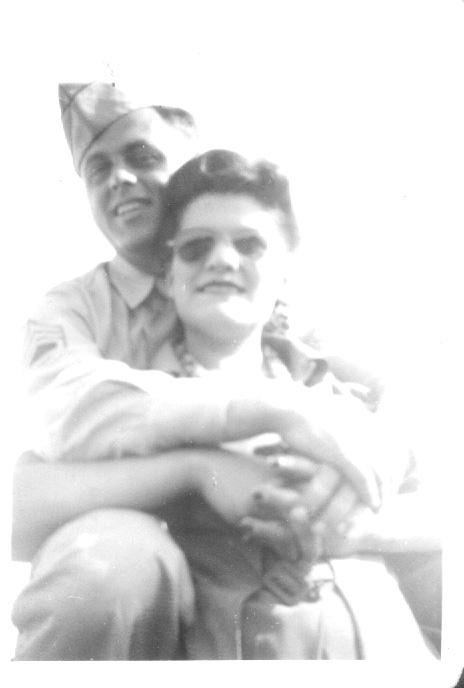 |
| 1945: Jack Baruch giving a hug to Lou's sister Molly. |
Leaving Charleston: November, 1945
Lou and I were discharged.
Every day, Edward R. Murrow came out with discharge news. You were granted
one point for every month in the service, plus 2 points for every month
of overseas service.
So Murrow used to report this every evening. We used to tune in while
we were servicing planes. So we would be outdoors, working on a B-24. Every
plane had its log book. You’d open up the log book and look at any
criticism the crew members had recorded or complained about each flight
and they'd be checked out. After 25 hours of flying time, they’d get
a better inspection.
I’d look up the communications section, as opposed to armaments,
for example. After 200 hours of flying time, we’d remove all of the
radio system and remove components and dehumidify them. They had cylinders
of silicon gel, and the coloring of the gel was blue when natural. When
saturated with moisture it would turn pink.
These planes were stationed in the U.S. Crews would come from navigation,
piloting, and other schools, and would be assigned to work as a team. They
would work maybe two months at Charleston Air Force Base. Then they would
fly a few hundred miles to Cuba, for team training, to practice landings
and take-offs.
Mom suffered from pains while in Charleston. The hospital was free to
us, but we never took advantage of it. We just were not informed. They could
have helped women just like mom there.
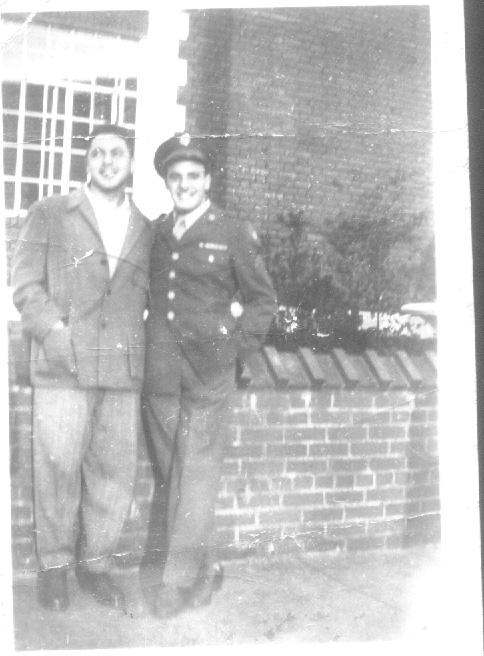 |
| 1945 - Best friends! Here I am with Hymie Baruch, on the
left. We were best friends for so many years. |
November, 1945: Discharge
I was discharged from Charleston
to Newark, as a Separation Center. We drove to Newark by car, in a 1932
Chrysler, which we had bought for $225.
It was pretty much a junk heap. I remember painting it myself with a
brush, and the wind was blowing sand on it! I painted it black, the most
practical color. The roof always leaked. I put tar on it, and it was always
leaked again.
We lived in a hotel room, with everyone sharing one bathroom. Mom and
I hated that hotel, mainly because of the shared bathrooms. We were there
for only two days.
They were anxious to get rid of us, and get us off the payroll. They
gave me a pin to show we were separated. That was called the Ruptured Duck
Pin, which I still have. I had only one, but I realized I would like to
have it on every item of clothing as an item of distinction. So I asked
the Quartermaster for two, and he said, "Oh no, only one per person."
So I went to a clerk and paid him a dollar and he gave me about 20 of them!
From Newark, we got a discharge. I was asked if I wanted to join the
reserve. But I did not want to be in the army any longer. This was probably
a good idea, since some of the people in the reserve were drafted into the
Korean War. Bu, we didn't want any more connection with the army and saw
no advantage.
So we just got in our car and drove to Alabama Avenue. One car was plenty
to carry our belongings. When V-J Day was declared, we left the movie theater
and the post in Charleston. I had one pair of civilian pants and a shirt,
which I had been carrying around with me for four years. I put on those
clothes just to celebrate, as did the other GI’s.
November, 1945 to July, 1948:
At 732 Alabama Avenue, Brooklyn
We were both anxious
to start our new lives. It had been arranged that we would for the foreseeable
future live at my parents’ house. My Dad bought that building during
the war. We had come as tenants. Then bank owned the building.
Our arrival was pretty routine. We were welcomed home. They were nice
to us.
Mom: "I felt uncomfortable, because I didn’t know them very
well. I felt we were imposing. We wanted to rent out a room, but no apartments
were available, because of GI’s coming home."
Jakie came home and started living with her parents. Jakie and Bella
wanted to move out. They had been living with the Mavorahs. Jack, too, wanted
to be on his own.
It was the worst thing I did... trying to get an apartment on Alabama
Avenue for my brother. Sophie and Avrahm thought that if an apartment was
available, first crack should be given to Bessy and Ikie. Sophie and Avrahm
were furious at me. Bessy wanted it, even though Ikie was nowhere around....
So nothing was done about the apartment across the street.
1945: Paying "key money"
We moved into their apartment, where they had an empty room. Molly’s
husband, Jack, had not come home yet from the army. Neither had Joe nor
Morris.
We would normally pay key money to either the landlord, or to the super.
But since I lived in my parents’ building, we paid none.
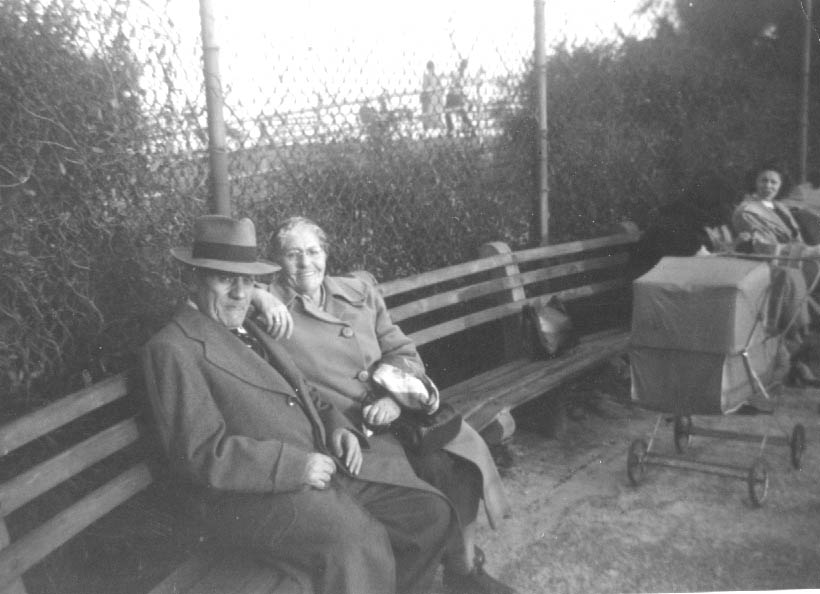 |
| Chaim and Mazalto, circa 1947 |
1945: Lou’s first job back: H & C Button
Company.
My first job, was arranged
for me by my brother Joe who had formed a partnership with Jack Hazan. Belts
and Buckles was the named of the business also called H & C Button Company.
I went to work for them as a general salesman. I knew how to work the sewing
machine. I had worked for Rene Dress before the war and knew the business.
I didn’t like it at all, because I hated his partner, Jack Hazan,
who was very disparaging of his help. He did very little but the business
rolled in. Manufacturers said, "Charge me two dollars a belt, so that
they could charge more to the retail stores."
They would actually pay fifty cents for the buckle. This all had to do
with Price Controls, and beating them. Price controls could be beat under
certain crcumstances. So all of this was to beat the government.
Jack Hazan would come in at twelve noon, knowing the place was taken
care of. He was a good-looking man, sugary on the outside, but really did
not give a damn about anyone. He had wanted me to go into business with
his brother, who was mentally ill. He wanted him taken care of. He viewed
me as a level-headed man.
I turned Jack Hazan down. I got paid 45 dollars by him, which I thought
was a decent wage. I went around to offices and showed dresses. We had wire-stitched
buckles, but I needed wire. I would scour the newspapers for wire suppliers,
and I would go and make appointments and go there with a sample of the proper
gauge wire that we needed.
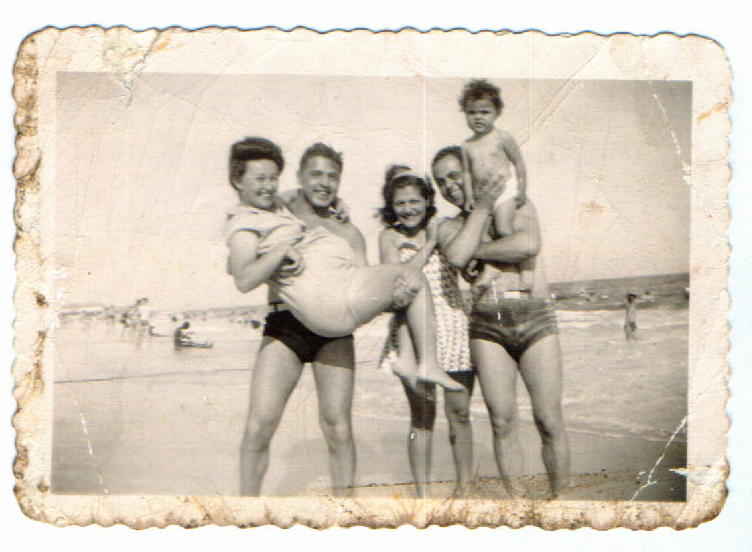 |
| 1946, Rockaway! Above: Here is part of the gang enjoying
a day's outing at Rockaway Beach! Shown are Edna and Hynie Baruch, Molly
Baruch, and Jack Baruch holding daughter Sylvia. |
Lazar Becker, Joe’s formeman
Lazar was the inside man, the
foreman, the belt designer. This had class and style. For years, Lazar was
known as Benyacker. Lazar’s dad committed suicide because of his severe
depression.
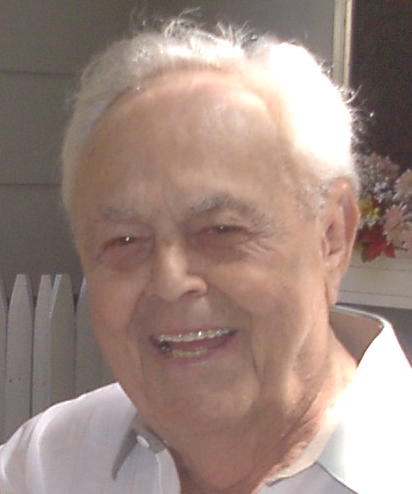
Jack Baruch on Aljofa Baruch
(Aljofa was Jack's mother. Jack is my father, Lou Cassorla's brother-in-law.
They all lived nearby each other in new Lots in the 1940's.)
"So far you're moving?"
When we were living on Pennsylvania Avenue, and Molly and I got married
and rented an apartment on Bradford Street in new Lots, 4 blocks away from
Alabama Avenue. So Aljofa, who lived near the as well said, "So far
you're moving?"
Those were the expectations then!
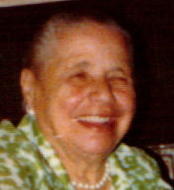 Aljofa Baruch
Aljofa Baruch
Aljofa's Disposition
My mom, Aljofa, even on her dying day always had a big smile on her lips.
So much so that the doctor brought his wife to see something like that.
To say, "See how a person a person can die with dignity and happiness."
She kept cheering everybody up. "My husband and my mother are there,
telling me to come. I can't wait to get there."
|
1947: Working as a Salesman in Brooklyn and
New York
I worked for Jack Russo
at Rene Dress. He taught me to be a salesman. His partner, Jack
Pardo, passed on during the war. Jack Russo went into partnership with Marty
Cassuto. From a little place they made quite a bit of money.
I went to work for him, but he paid me off the books, so I could collect
twenty dollars a week. I joined what they called the 52/20 club. The government
allowed discharge veterans to collect compensation and just to report their
attempt to find employment. You would report unable to find work. "No
work for salesman," I would say and I would get some money from the
government
In fact, I was being paid by Jack, 45 dollars a week, plus twenty dollars
from the government equaled 65 dollars.
The houses back then cost $25,000 when brand new. Then they went down
in price. The previous owners had let the houses go to pot. So the prior
owners had defaulted on the mortgage. My father bought the house for $7,000.
I don't know if he paid cash. He had been making a pretty good dollar during
the way. Anybody could see a bargain.
Molly was married to Jack, and during the entire war, she brought up
the baby, Sylvia. We would push Sylvia through our legs, and she would say,
"YAHH!" with laughter. At a year and a half, she said, "I
want chichen." She could not say chicken.
While living there, I was always looking for an apartment. I lived in
the upstairs apartment with them. They rented out the downstairs, but not
as a whole floor. Instead, people wanted to rent out a dining room or a
bedroom.
Living in the house at the time were: Mom, Dad, Bessy, Molly, Sylvia,
and ourselves.
1947: Living in Brooklyn
While we were there I would make myself feel comfortable by going to
Cushan’s bakery, and coming home with muffins and cakes and turnovers.
This showed the Cassorla family that we were not grubbers. We’d have
coffee or tea. We paid ten dollars a week for room and board.
My brother, Jakie was in Europe. Veida was sending things to Europe in
the 1920s and 1930s.
They might have sent letters to Kastoria.
The brothers and sisters talked about good times by the lake, by which
they meant Lake Dulac in Kastoria. Veida came to America with 3 boys. Her
sister was born in 1912.
Sophie Nahmias: They were wonderful, the brothers and sisters, we were
one big happy family. Our conditions were not luxurious. All the children
were like one.
Whenever they didn't want us to understand, they would talk in Greek.
Veida told Sophie about fairy tales. For example, about the man who carried
the coffin to the cemetery. They took a man to bury him on a bumpy road.
The coffin fell out and threw the man came out, and he woke pu and lived
for many years. He was in a coma. He lived for many years after that.
Father story is like a fairy tale... My father's mother, was Mana (grandmother)
Chanyu. My father was an only child. He had the flu and pneumonia, perhaps
in 1920, and people were dying.
Sophie, continued: I was consdered Mazelto's daughter because I had red
hair like Mazelto. Mazelto took us to Coney Island on a picnic We called
each other from rooftops to say we were Coney
Betty, 11-27-99: We lived for 5 years in our parents' houses before getting
our own place.
We stayed with Cassorla's upstairs from 1945 to mid-1947. We had a bedroom
in the corner. Joey was here, Bessy too. Morris was at Selma Silverman's
house.
Selma was very pretty, (Dad says). Morris, Jack Barocas and Howie - a
friend of Jack's -- chose for who would be first to approach Selma. She
was a new arrival in New Lots. So Moishe won, and his friends called him
Pretty Boy -- He was so good-looking.
Cousin Joseph Elias remembers
1948
You know I gave your Uncle Jack Camhi his first airplane ride at old
Rockaway Beach Airport. I had invited him. He did all right. He was a pretty
brave guy. It was a J3 Cub. We were sightseeing as they were building Idlewild
Airport.
What made it funny was that he had never been in a light airplane before,
and he thought we were on the ground, and instead we were still floating
up to the runway. He opened the door, I had to grab him.
1953
Morris and Selma and Betty Elias were close friends and used to push
their baby carriages up and down New Lots Avenue. That must have been Sandy
Cassorla and JoAnn Elias.
1950
When Dad and I were tenants at the Cassorla's on Alabama Avenue, and
I was pregnant with Albert.
Dad: Mom had been used to giving her dad her pay envelope. Now she had
carte blanche and could depend her paycheck on whatever she wanted.
Dad: I got 70 dollars a week and Mom got 60. Mom and I put away 50 dollars
a week. We were saving for a beaver coat for Mom.
We also wanted an apartment,. My cutter friend was jealous of what we
had, but we said, "You know? What we want is what you already have
-- an apartment and a baby."
Dad: We gave Mazalto and Chaim 20 dollars a month as rent and when we
switched, my parents got 10 as rent.
Mom: When I stepped giving money to my Dad, my sister stepped in. It
made it harder for my father to pay for insulin for my mother.
Dad: Insulin was free at Kings County Hospital (where Mazelto went).
Mom: My sister Esther helped out when I stopped paying. Chaim made the
trip on the trolley to get the insulin, which then soon became free.
1946, Mom: I worked in the belt and buckle
business for Jack Hazan, Del Rio Belts and Agency Button Company. Jack Hazan
lifted up Lazar (Lou's cousin), and threatened Lazar for wanting too many
needles for my sewing machines. Lazar was small, and Jack seemed like a
brute. I thought he was terrible. I had asked Lazar for the needles, and
he was just trying to help me out. I was trying to teach some people how
to use the sewing machine.
Dad worked special machines and Lazar was a foreman.
It was very hard to get an apartment. We were lucky to pay $500 to get
an apartment. You had to give landlords presents. There were price controls,
and we'd give cash payments under the table. That was called key money..
Mom: I liked living with the Cassorla's. Sophie was nice, and Joey was
too. If a car passed up the street, the mattress would vibrate and make
a ticky-tick noise.
Joe slept right outside our bedroom, and I, Mom was very embarrassed.
The twin beds that Emma and Ben use were bought in the 1930s by Joe.
Molly lived there with baby Sylvia, and Jack was in the Army. One time.
Sylvia was screaming in her bed, maybe age 1. Molly came out of the shower
nude to see what was going on. She turned around, and Mom (Sophie Cassorla)
shooed her right back into the bedroom.
I got along well with Molly. Sylvia got a skin sickness. Molly during
the war went to a doctor asking about a skin clinic, Syl had. She went to
a clinic on the Lower East Side. An old doctor there, whom they said looked
like God, treated Sylvia.
Sylvia contracts "soldier's baby's skin
sickness"!
Jack Baruch asked what the baby's ailment was and got different answers.
Jack pressed the doctor for the name of the disease, and the M.D. said:
"Your daughter has soldier's baby's skin sickness."
Mom: I was Uncle Morris's idol. He liked me He's 3.5 years younger than
me. I remember that instead of saying lollipop, Morris said "I want
ollypop."
Uncle Morris got lost as a little boy in Coney Island in Seaside Park,
near the Beach, at West 2nd Street.
1928, Dad: It was an ordeal to go the beach, changing subways 3 times.
Little Morris got lost. we were besides ourselves.
At the beach, he wandered off. He was lost and it wads nighttime. Somebody
had taken him home to New Lots. We did not have telephones in those days.
We just hoped someone had found him and brought him to their home.
1928: We were going to the beach one day, carrying food. Molly said,
"I don't want to carry it." She was 10. Dad said: "I don't
want to leave it there, that's Mom's food in the valise and we can’t
leave it on the street." So I dragged the cheap valise, made out of
cardboard, 8 years old.
1945-47 - Mom: We stayed at the Cassorla's. The bedroom were relatively
large. Grandpa bought that building during he war. It cost $7,000. It was
grand, with steam heating.
Dad: After working at Jack Hazan's, I ended up with my own business with
Moishe, called Casbro-Cassorla Brothers. We had that for 8 months, and it
was hard to get help.
So we had Mom and Selma as partners. We bought an established shop in
Canarsie, advertised in Women's Wear Daily. We looked into it. It
cost $2,000.
1948: Casbro-Cassorla Brothers
My father lent us $1,000 each. I had some lottery money, and an insurance
policy.
We came into a slow season, and I did not know many people in the line.
And people who had work for us no longer did. It should not have discouraged
us so much, but we sold it for $4,000 in 8 months.
As veterans, we got approved by Singer for sewing machines for say 50
heads. I enjoyed working with Moishe. We alternated the hours of working
on the pressing machine. He was pretty good. ''
He was young and burly. When I pressed, I did so much more. Later we
had 2 pressing machines...
Morris lived first with Mrs. Silverman (Selma's Mom) and then got an
apartment on New Lots avenue.
We move out of Grandma and Grandpa Cassorla's house in 1947, after spending
the summer in the bungalows at Rockaway Beach.
We had our own place in Rockaway, one room with a rented fridge. Everyone
else had an ice box. They blew fuses all the time. If we ironed, we had
to either turn off our lights or the fridge.
1948: Movving into Williams avenue.
New Lots, 732 Alabama Avenue
1945 - 1957, Ages
25 to 37
1950: News of Cousin Albert Cassorla
We got word from a Jewish
agency (or the Jewish Welfare Boardor HIAS) that my first cousin,
Albert Joshua Cassorla, (the same name as my son) was seeking entrance into
this country, but that he needed certain statements in order to admit him.
Pop remembered Albert vaguely as one of three or four children of his
brother (perhaps Joshua Cassorla). My brother Joe co-sponsored him. First
Pop consulted Joe about employment for him. Joe had a pretty big establishment
and felt he could find room for him in the factory.
Correspondence went back and forth. He wrote from a displaced persons
camp. We don't know what country he was writing to us from, it could have
been Germany. Originally, he was no doubt from Monastir, Yugoslavia.
After the war, people in concentration camps moved to the other camps.
He might have been in Buchenwald -- it was certainly a famous concentration
camp.
He was a big, strapping man. He arrived perhaps in 1950. He looked like
others in the Cassorla family, with dark features, no beard, husky -- a
guy you wouldn’t want to tackle. The Hebrew Immigration Aid Society
helped people like Albert.
By this time, all of my mother's children had left -- five children grown
and gone, except perhaps Bessy. There was a room and a job for him, but
he seemed discontent. He asked me once for a "loan." I knew he
wouldn't return it; he already impressed me as that type of fellow.
My Mom and Dad prohibited me from lending to him -- they felt they had
done all they needed to for him, and let him prove himself from here on
in. He was very physically capable and had a job and a place to sleep, after
all. He ate like a horse. My mother cooked for him as if he were a horse.
1955 - Alyce
Reiner (nee Baruch) remembers Joseph Baruch
One of my favorite memories was when my Grandfather Joseph Baruch (we called
him "grandpa Baruch" always using surnames) would let me drink
coffee at the table - I was around 5 or 6 at the time
My mom always said I couldn't have coffee because it would "stunt
my growth" - Anyway - grandpa Baruch would signal my grandmother to
bring me coffee she'd put in 3/4 cup milk 1/4 cup coffee
and 6 teaspoons of sugar and my mother would be complaining
"Hy, she's too young! It'll stunt her growth"
Anyway, little did my mom realize the sugar added to my growth - just not
in the direction we wanted!
Just little memories, but they bring a smile to my face. Hope you enjoy
the memory too.
Alyce
|
The Bellmore Years
1957 to present - Age 37 to
now
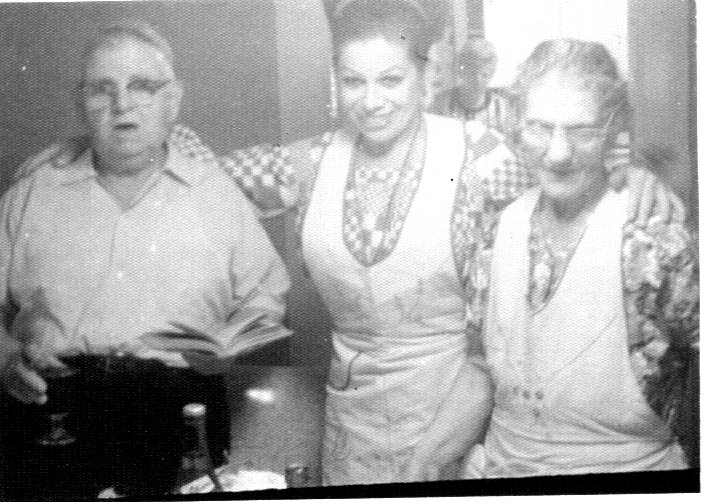 |
Whenever anyone had a conflict -- an argument ona factual subject
-- they'd all say, "Ask BIG LOU!"
Once, we all went to a theater, and we went home following Lou. He made
a right and then a left.
Fifteen minutes later, he pulls out in front of us and says, "I'm
lost!" |
| Gabriel and Sinoyra Calderon with Betty in the 1960's. |
I've always been fond of quoting statistics on anything. I'd say, "365.1
people out of 400 say so and so." |
Leo Moskowitz, 1957
I first met Leo when
we moved in from New Lots in 1957. Leo had a kosher butcher shop in Merrick
on Merrick Road, near the Chinese Laundry, where Daddy almost got killed.
I was looking for a kosher butcher. We asked the neighbors and they recomended
him. I became his best customer, paying cash each time. I paid $60 a week
in meat bills-- maybe a two-week supply. $60 then would be worth about $180
now.
I'd buy chickens, cut into eighths, tenderloin steaks, rib steaks, but
rarely chopped meat (for stuffed peppers only). I never bought brisket,
which is ashkenazi-style. I would buy London broil. I'd get square-cut roasts.
I wouldn't buy too much deli meats.
Leo one day came over and smelled my potato pancakes. He said, "I
MUST have Betty's pancakes." He ate dinner with us, ignoring his helpers
working for him back at the shop!
Betty's Latkes
This is an ashkenazi food that we came to like.
Ingredients:
- Matzo meal
- potatoes, grated in strips
- onions - (drain the water after cooking)
- eggs
- pepper and salt
Fry and eat right away!
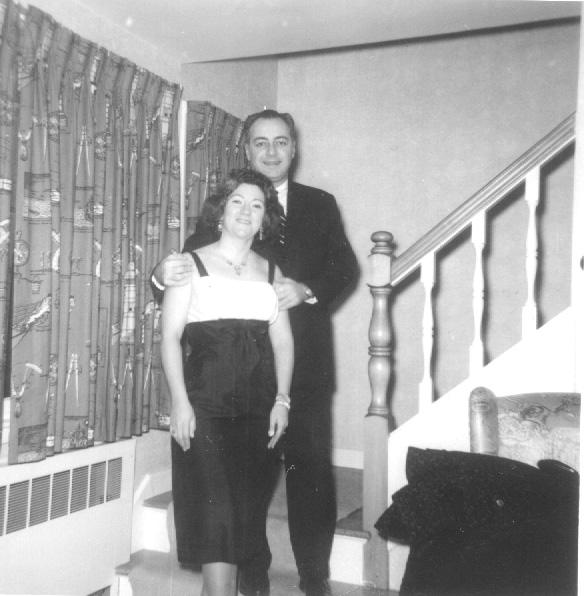 |
| 1960: Two of our dear friends - part of our social club
-- Esther and Ben "Flash" Elias. We had so many wonderful times
together! |
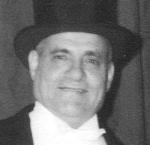 |
1959 - Avrahm and the Panakootie
Fish
I'm not quite certain of the year, but my father, Avrahm Cassorla was
spending time in Florida. He happened to be with his lifelong friend, Isaac
Baruch. |
|
Isaac was a white-haired, fun-loving man who loved a good tale.
The two of them told jokes and laughed about continually.
So they were standing at this dock in Miami Beach. A fishing boat had just
pulled in. My dad and Isaac were standing on the dock looking on as the
catches were being hung and weighed.
|
|
A man standing near my father was puzzled by one unusual specimen.
"Hey, what kind of fish is that?" he asked my father.
My dad replied, "That one?' Oh, that's a panakootie fish."
"Panakootie? I haven't heard of that kind. That's interesting."
"Yes, that's what it's called."
Isaac tried to keep a straight face but was practically busting a gut.
Betty adds:
They told and re-told this story many times. Ikie Hasson used to love
telling this story and laughed each time.
|
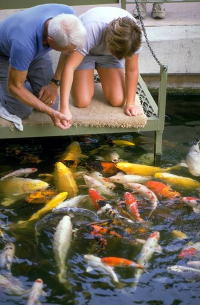 |
Fire at Leo's, 1960
Leo went out of business
when his first store burned down. Many other stores burned down, too. Once
I called Leo at his home looking for a kosher turkey.
Leo went into business with a man named Sandy Gordon, who had an existing
business in Freeport. They tried to have a ready-made take out business,
but it failed and they lost a lot of business.
Then a Yiddish couple wanted to open a kosher butcher shop near Waldbaums.
The three of them went into business together, but fights among the owners
and a wife were constant. And then one day, Sandy died. No one told Mom
about it because she loved him so much.
What was nice about Sandy was his sincerity. He was a blondish red-head.
We saw at Jones Beach a lot with his wife and his two daughters.
When I finally figured out that Sandy had died, I asked, "Why didn't
you let me know about Sandy's demise?" I wrote a nice letter to his
wife and their two daughters. I told how I loved Sandy, and how much we
loved the way he treated them.
I got a response from the wife that said, "How wonderful to know
that my husband made such a powerful impression on people."
Leo went to Florida and retired.
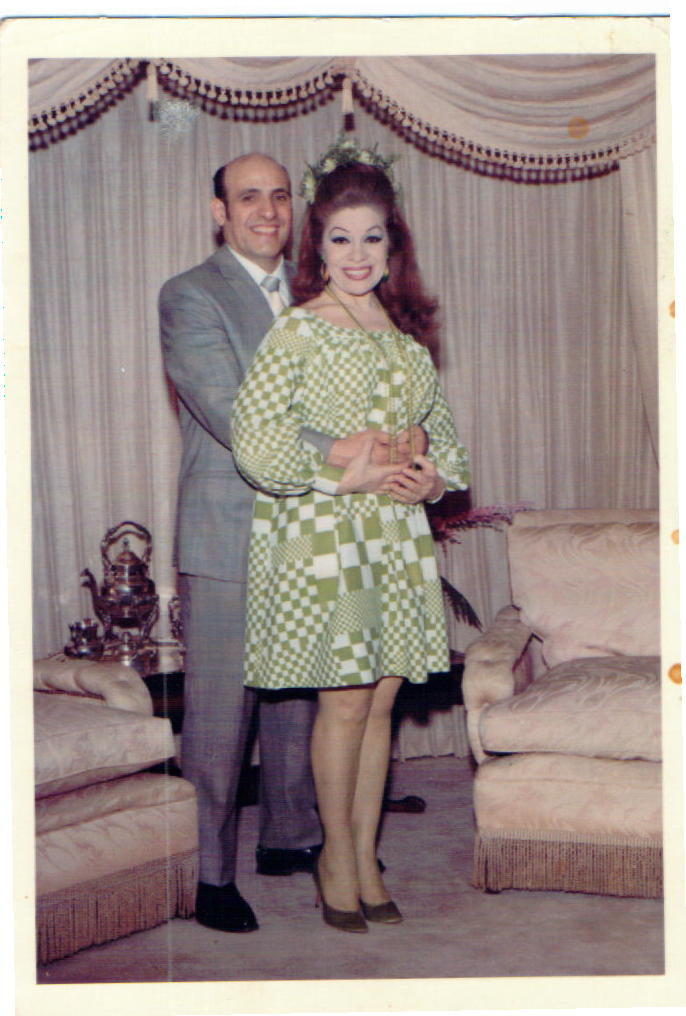 |
| Here we are, about to celebrate our 25th Wedding Anniversary in 1969. |
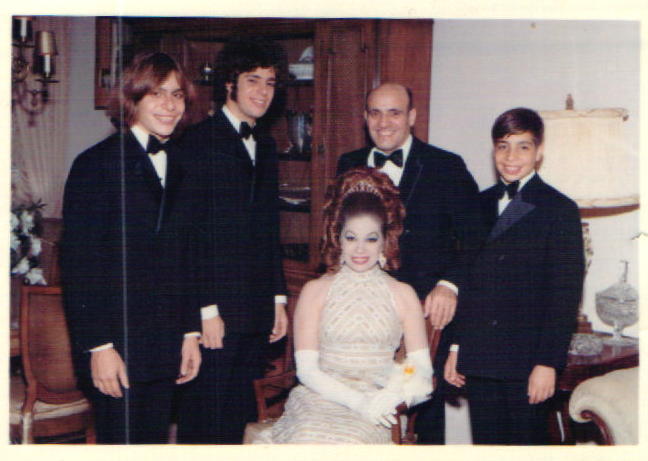 |
| Dressed up in our finest, also in 1969. Left to right are: Kenny, Albert,
me (Betty, seated), Lou and Marshall. |
1962 - Marshall Shaves with Lou!
Marshall: " I was probably at the age between 4-6 years old.
I used to get up every morning with Dad and he'd put lather on my face.
He would give me a razor (same shaver I use today) with no blade in it but
I didn't know any better.
"I would shave off the lather and feel just as grown up as a full
adult. I would then put hot water on my face to take off the leftover lather
and then Dad would put some after shave lotion on my face so I would smell
good."
1993 Sarah Errera hears voices calling her to heaven
Betty:
Sarah Arera had a daughter, Julia, with so many freckles.Julia married
Dave.
Sarah married my Uncle Jaku. When Sarah almost died, she held my hand
and said, "Rivka, I hear them calling me. I wil be dancing with your
parents. Estata llamando. They want me to be with them now. This will be
the last time I see you. "
She was kissing my hand and fingers. I kissed her good-bye, and she kissed
my hand, and we left. I love to visit my cousins. Short visits, but always
in contact.
2003 - Lou and Professor Block
I like whatever courses he offers.
All are history courses, such as America Today or The World Today. He
steers away from the usual question, such as capital punishment. Each session
is an hour and a quarter. There's also an art course downstairs, but if
I took it I'd fall for the hog stools!
In the anatomy course, I'd have problem with their paring lot. I could
not find a space near. I walked forever, and I arrive late. I don't get
lost.
TO BE CONTINUED…
The End… for now!































